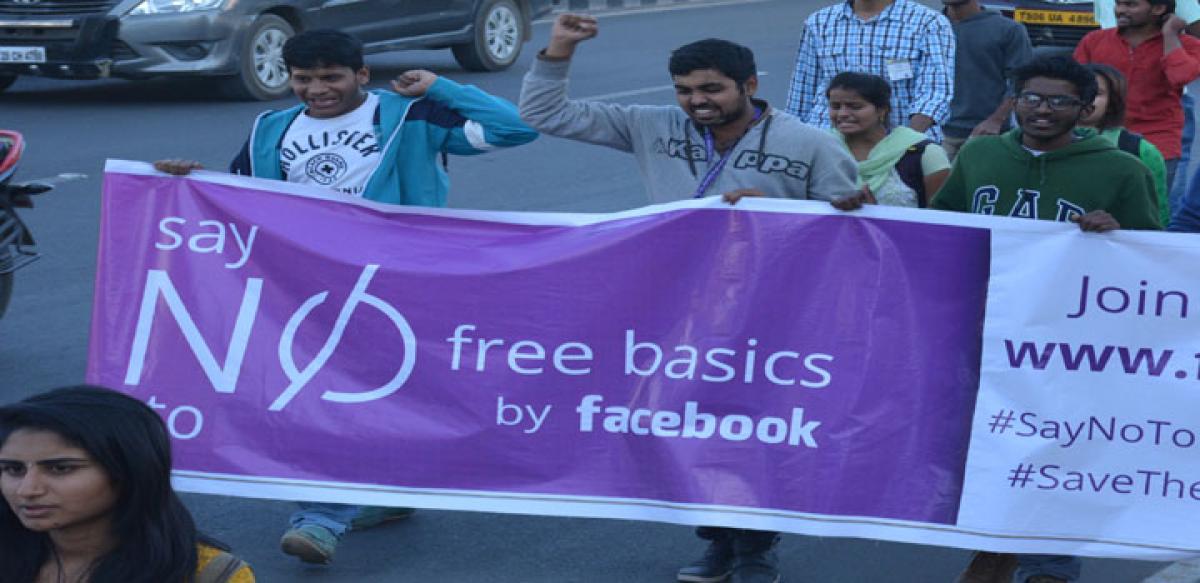Live
- DEO suspends teacher accused of sexual assault
- PM ‘cursing’ Congress out of despair: Maharashtra Cong Chief
- Applications are invited for Junior Colleges Scheme District Scheduled Castes Development Officer Ramlal
- A nomination was filed on the second day for the Nagar Kurnool parliamentary seat
- SP Gaikwad inspected the Telangana Amarnath Saleswaram Jatara yatra arrangements
- Rahul Gandhi's decision to contest from Wayanad shows 'lack of confidence': BJP President Nadda
- IPL 2024: Delhi bowlers will go after all of SRH’s top-order batters, says head coach Ricky Ponting
- At Amroha rally, PM Modi sends out ‘meaningful’ message for Muslims and Hindus
- Tripura records highest 79.83 pc voter turnout in Northeast
- The government has to clear the confusion
Just In

x
Highlights
First splashy full page ads in newspapers and now a personal piece by Facebook CEO Mark Zuckerberg in an English daily defending Free Basics, the war over \"free\" or “selective” internet services for the poor and net neutrality has entered a new phase.
Appropriating social space?

New Delhi: First splashy full page ads in newspapers and now a personal piece by Facebook CEO Mark Zuckerberg in an English daily defending Free Basics, the war over "free" or “selective” internet services for the poor and net neutrality has entered a new phase.
“Free Basics should stay to help achieve digital equality for India. Free Basics is a bridge to the full internet and digital equality,” Zuckerberg wrote in his opinion piece, defending his ambitious initiative to provide a pre-selected suite of internet services to those who can't afford it.
“There’s no valid basis for denying people the choice to use Free Basics, and that’s what thousands of people across India have chosen to tell the Telecom Regulatory Authority of India (TRAI) over the last few weeks,” he claimed. On Tuesday, Nikhil Pahwa, a volunteer with savetheinternet.in, wrote a counterpoint in the same daily against Zuckerberg's appeal to save Free Basics.
"Why has Facebook chosen the current model for Free Basics, which gives users a selection of around a hundred sites (including a personal blog and a real estate company homepage, while rejecting the option of giving the poor free access to the open, plural and diverse web," he asked the Facebook founder.
Appropriating social space
“The so-called Free Basics is a collaboration of Facebook, Reliance at the moment and any mobile operator can join it. This is nothing but rebranding of infamous internet.org,” said the fastest growing English daily, The Hans India, in its editorial, Appropriating social space.
“There is an attempt to garner support for Free Basics through notifications and messages on Facebook itself. Many netizens are complaining that they unwittingly sent email to TRAI in support of Free Basics because of a misleading and deceptive Notification mentioning Digital Connectivity on everyone’s Facebook profile,” it elaborated. Users who log on to their Facebook accounts are greeted with a message: “Act Now to Save Free Basics in India.
Send a message to the Telecom Regulatory Authority of India (TRAI) and tell them you support Free Basics in India.” Some users are even receiving “notifications” from friends: “sending messages to TRAI about Free Basics.”
TRAI has announced a Wednesday deadline for public’s response on Free Basics while people can go to the online portal savetheinternet.in to register support for net neutrality. For those who are yet to be part of the ongoing debate, Free Basics is an app that gives users selective access to services like communication, healthcare, education, job listings and farming information -- all without data charges.
On the other hand, “net neutrality” means that governments and internet service providers treat all data on the internet equally and, therefore, not differentially charge users, content, platforms, sites, applications or mode of communication. Facebook rechristened its free internet platform internet.org -- which it developed in conjunction with Reliance Communications Network -- as Free Basics in September.
According to Facebook, it has been able to offer Free Basics services to a billion people across Asia, Africa and Latin America. According to Pahwa, India is expected to have 500 million internet users by the end of 2017. “What kind of an internet they get access to is important for our country. This is why the battle for Net Neutrality, with the last and current TRAI consultations included, is the battle for our Internet Freedom,” he wrote.
Meanwhile, a post on “Save Free Basics in India” Facebook page read: “Free Basics is in danger in India. A small, vocal group of critics are lobbying to have Free Basics banned on the basis of net neutrality.”

Next Story
More Stories
ADVERTISEMENT
© 2024 Hyderabad Media House Limited/The Hans India. All rights reserved. Powered by hocalwire.com







